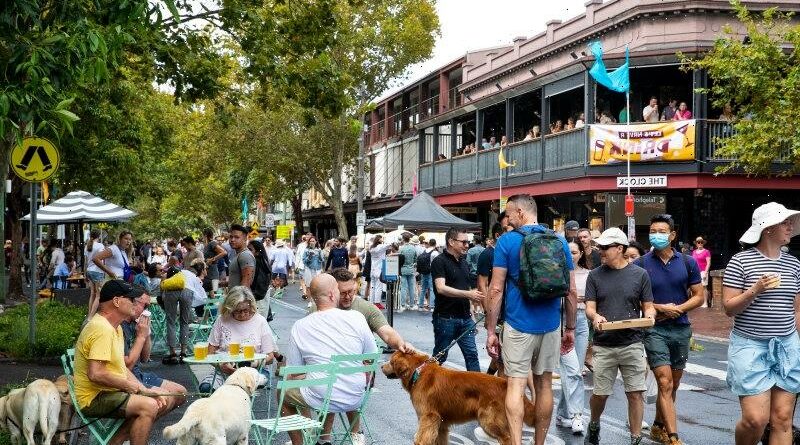Shutting Sydney’s high streets brings communities back together
Surry Hills shop owner Nicola Reindorf says last weekend was the highlight of her retail career. Not because of sales, although it was a good day for trade, but the spontaneous party that erupted outside her store mid-afternoon on Saturday.
It started with a DJ spinning tunes in her shop window, then some toddlers dragged their parents in for a dance – and by the time the rain came hours later, it was barely noticed by dozens of people swaying to Jay-Z and Alicia Keys’ Empire State of Mind on a packed Crown Street closed to cars for the day.
With the road closed to cars, people take to the street in Surry Hills.Credit:Edwina Pickles
“This time nine months ago the street was empty and I was coming to a locked up shop to pack online sales,” Ms Reindorf said.
“After two years of everyone being pent up, it was a real community celebration of letting off steam … I had not seen so much joy and happiness in such a long time.”
The City of Sydney’s summer streets series has tapped into the global trend towards reclaiming public spaces for local communities during the pandemic.
The council has shut its best-known inner city high streets to traffic for one day, with cars and buses replaced by street furniture, a crew of roving entertainers and pubs or bars that spill out onto the road.
Eva Loyd, an academic studying neighbourhood street life at UNSW, said loosening the city’s tight regulations and putting trust in the public and local communities – who know their neighbourhoods intimately – was “hugely important” to enliven public spaces and make them more inclusive.
“We start to foster the really visceral social connection that has perhaps been lost, particularly in COVID. The opportunity is to leverage this a little bit more,” she said.
“In Sydney, the vehicle has been the dominant actor in our streets. These closures give a really demonstrable example of how life can become the dominant actor.”
The program started with an event in Kings Cross last month, which was followed by Redfern Street and Crown Street. Rather than inviting external vendors to set up markets, the focus was on local businesses; one local bottle shop said its sales were up 900 per cent that day.
Attendance figures have also grown over the weeks; from an estimated 1600 people in Kings Cross to more than 3000 in Redfern and 5000 in Surry Hills. The next event is at Glebe Point Road on Saturday, before it moves to Harris Street, Pyrmont on February 19 and Stanley Street, Darlinghurst on March 12.
Potts Point Partnership chair Brandon Martignago, who owns Dulcie’s cocktail bar in Kings Cross, said there had been mixed feedback from businesses about the council’s execution. Some said they didn’t have enough warning to properly participate after a stressful Christmas period.
There was also frustration the council had taken so long to warm to the idea. “We have been pushing for street closures the last two, three years, especially during COVID, as an opportunity to activate neighbourhoods and use outdoor space,” Mr Martignago said.
“But the final result was the city setting a benchmark that shows they can do it. While these might not have ticked everyone’s box, it set a precedent for knowing what we can do moving forward.”
He said the benefits were obvious: residents engaged with drummers, brass bands and drag queens; the regular Saturday Potts Point markets had a bigger footprint; hospitality venues were able to extend outdoor dining to more patrons; and retailers had more eyes on their products.
The City of Sydney has shut its best-known inner city high streets to traffic for one day each, with cars and buses replaced by a crew of roving entertainers and pubs or bars that spill out onto the road. Credit:Edwina Pickles
“It was a better atmosphere that took it away from being a commercial high street with cars, to a community space where people could bring kids and walk their dogs,” Mr Martignago said. “We definitely want to do it again.”
Lord Mayor Clover Moore said the cost and logistics of road closures had been a deterrent to running street parties in the past.
“The pandemic has created an environment in which the community is overwhelmingly supportive of our work to help businesses operate outside and unprecedented collaboration with the state government has made the closures logistically possible.”
Each street closure costs the council about $140,000, covering roving entertainment, security, staffing, fencing, furniture, decorations and hostile vehicle mitigation. But the bulk of fees go to NSW Transport for road closures as well as user-pays police.
Cr Moore asked the state government to waive those charges for any council who wanted to run a similar event during the Sydney CBD summit on Friday. “Even covering the costs of these services would be a huge step towards sustainability of the events,” she said.
The council has also requested $5 million from the state government so it can repeat the series another four times this year.
“We’re sure that with a steady calendar of closures, businesses would invest in infrastructure and offerings to make these events even better, and the wider community would come to enjoy the party,” she said. “People want to get out of the house and enjoy what Sydney has to offer, safely.”
A cultural guide to going out and loving your city. Sign up to our Culture Fix newsletter here.
Most Viewed in National
From our partners
Source: Read Full Article





